Moon Knight is off to a strong start! The pilot “The Goldfish Problem,” was written by showrunner (and alum of my beloved sequel to The Exorcist) Jeremy Slater, and directed by Mohamed Diab. We meet Oscar Isaac’s Steven Grant, who is a mild-mannered gift shop employee who just wants to be a tour guide. Over the course of the first hour we learn that there’s more to Steven’s life and brain than meets the eye, he runs afoul of a cult leader, and we get a glimpse of our titular character…
Spoilers ahead.
Recap
The episode opens with a scene of Ethan Hawke’s Arthur Harrow sitting at a table, palms up as if in supplication. He has scales tattooed on his right wrist. He drinks either water or a clear liquor in a small glass, wraps the glass in a blue cloth, breaks the glass with the silver handle of his cane, and finally pours the shards into his sandals, which he then, very deliberately, steps into. It crunches with every step. We don’t see the blood, but we can certainly imagine it.
Then we get the opening Marvel logo.
Did I mention that this scene is set to Bob Dylan singing “Every Grain of Sand,” the closing track from Shot of Love, the last album in his trilogy of Christian albums? (Have I told Moon Knight lately that I love it?)
This is a bold statement! Not only to open on the (presumed) villain—but to open on the presumed villain doing something dark and twisted with THAT song playing in the background as some sort of warped riff on the best song from Godspell?
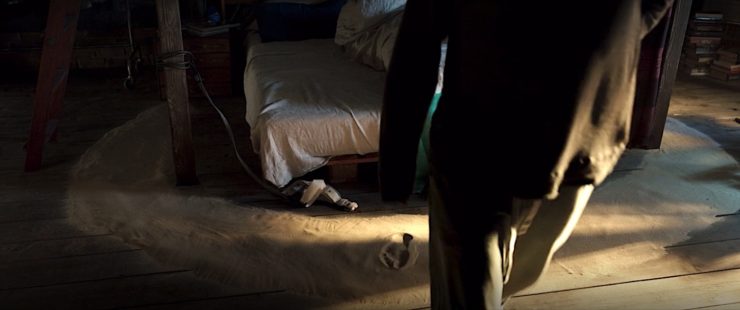
I was a little excited.
And it just got better from there! We follow Steven Grant through a normal day: he wakes chained to his bed, an undisturbed circle of sand surrounding him. He goes in for his shift at the museum gift shop. He’s late, he gets yelled at a lot, he’s reminded that he has a date the next night that he doesn’t remember scheduling, he stops by to talk with a living statue he’s friends with, and then he goes back to his lonely apartment, using an app and reading to try to stay awake. When sleep begins to overcome all of his tricks, he chains himself to the bed.
But then… he’s in a sunny meadow somewhere in the Alps. He’s in a great deal of pain and his jaw seems to be dislocated. He’s so confused that even when large men with guns start shooting at him he doesn’t flee until a mysterious voice tells him to. Slowly, he learns that he’s in a bucolic town in Germany, and he seems to have stolen a gold scarab?
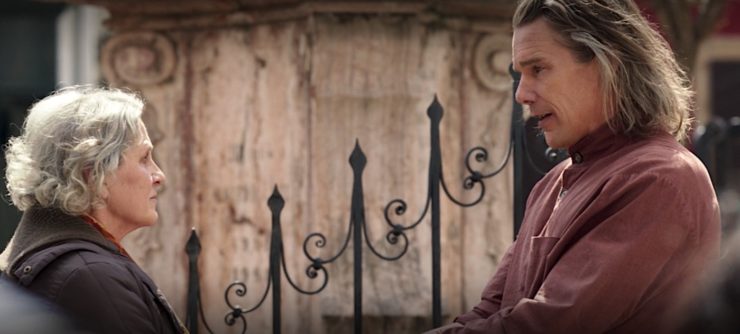
We meet Arthur again, holding court in a crowd in the center of town. He invites people to be “judged” asking “Will you accept your scales regardless of the outcome?” Judgement seems to be a somewhat DIY version of the classic Egyptian afterlife ritual: Arthur Holds the supplicant’s hands, balancing the head of his cane across their wrists. Both people watch as Arthur’s scale tattoo begins to move, apparently weighing the supplicant’s… soul? Morality? It’s unclear. The first person is found to be good, and Arthur embraces him. The next person isn’t so lucky. The scales turn red and fall to one side. When she protests that she’s led a good life, Arthur says that he believes her, but that Ammit can see our past and future. And her protests are moot anyway because the woman has already turned grey and limp. Guards carry her body away.
By this point, the people chasing Steven are able to inform Arthur of his theft, and Arthur confronts him. As Steven tries to return the scarab, his body rebels, twisting away and clenching his fists. This is when the blackouts start, and Arthur’s followers learn what happens when you meet a stranger in the Alps. Whenever the situation tips into “Steven’s about to die” the frames shudders, and then Steven seems to wake back up surrounded by bloodied bodies. He manages to steal a cupcake delivery truck to escape the town square, and we’re suddenly in a surprisingly effective chase scene, as “Wake Me Up Before You Go-Go” blasts in the background and Steven winks in and out of consciousness. At one point the terrifying voice tells “Marc” that if Steven gives up the scarab he (the Voice) will kill both of them (Marc and Steven) and it all gets a bit tense.
Steven wakes up in his own bed. He’s relieved, until he realizes that his fish suddenly has two fins: It only had one before. The pet shop owner is dismissive and reminds him that he was just in yesterday, which he does not remember, but he has no time to deal with that as he realizes he needs to rush if he’s going to make it to his date on time. But then… she doesn’t show up. And when he calls to remind her, he learns that it is not, in fact, Friday, the day of their date—it’s Sunday, she’s furious, and he’s lost his shot.
Steven ends up back home, eating the chocolates he bought for her. He drops the chocolates, finds scuffs on his floor that lead him down a path of vague clues until he finds a hiding place with a phone and a key. Someone named Layla has called many, many times. When he tries to talk to her she calls him Marc, says she’s been calling for months, and seems very upset. But when he asks who she thinks she’s talking to she hangs up. He hears a voice again—not the one that harassed him in the Alps—and as he tries to run, he realizes he’s being chased by a terrifying robed figure who flashes in and out of sight. Then he wakes up on the bus to work, where he promptly sees Arthur.
Who, of course, follows him into the museum.
The next thing he knows he’s been surrounded by Arthur and a couple of followers, including a museum guard. Arthur speaks to him quietly, explaining that he’s working on behalf of Ammit, a goddess who “knows past and present, what we’ve done, and what we will do.” According to Arthur, had Ammit been free upon the earth she would have thwarted Hitler, Nero, and Pol Pot, and prevented the Armenian Genocide. And then Arthur attempt to “judge” Steven, grasps his hands—which Steven does nothing to prevent—but we don’t see what the scales do, only how Arthur responds. He tells Steven “There is chaos in you” and then Steven manages to run again, and Arthur lets him.
Later, during inventory, Arthur sets a giant Anubis-looking mummy-jackal-creature on him. It chases him into a bathroom, where, of course, the walls are lined with mirrors, and Marc finally addresses Steven directly from one of them. Steven gives in and allows Marc to take over. Once again, we don’t see most of the fight, only its aftermath, as the beast attempts to escape and is pummeled into the ground by Moon Knight, who stalks into the camera as the episode ends.
May you be well when you hear this
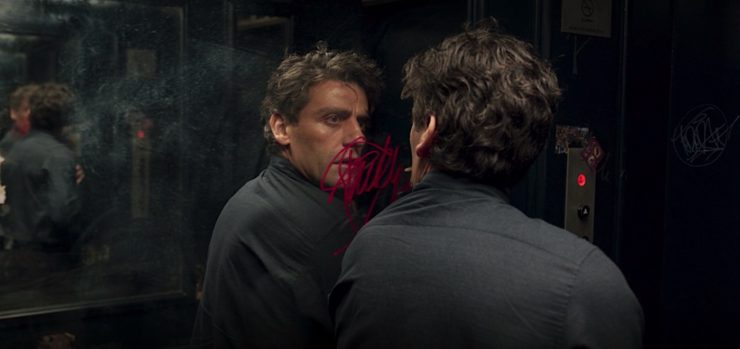
I don’t even know where to start with commentary for this show! There’s so much! I’m so happy!
As people noticed in the trailer, there are mirrors everywhere. Between bathroom mirrors, pools of water, mirrored elevator walls, shadowy bus windows, glass museum cases—Steven is constantly being doubled and tripled, and many shots turn out to be reflections of the actual action.
Early on we see shots of Arthur walking on broken glass, and a moment later we see Steven walking on sand, which obviously becomes glass when it’s melted blah blah blah what I’m saying is IT’S COOL. They’re mirroring each other, and the show is weaving in the glass/mirror/water/sand imagery constantly.
I had to watch every scene between Steven and Arthur through my fingers. As we’ll talk about in a moment, I’m bring some of my own baggage to this show, but still, this felt like nigh-Murdock/Fisk crackly chemistry between them, and I really hope the show wrings it dry.
There’s a William in Steven’s gift shop!
Not only did the show set its tone with that creepy opening scene, but it builds on it a few scenes later. When Steven starts explaining mummification and judgement in the underworld to a little girl, we think it’s just going to be a cute case of the museum work freaking the child out as a light tap on the wrist for sticking her gum on an artifact. Instead, the whole thing turns on his head when she asks, “Did it suck for you? Getting rejected from the field of reeds?” and he responds by saying “Well that don’t make sense, cause I’m not dead, am I? …am I?” before the scene is interrupted by Donna being a jerk.
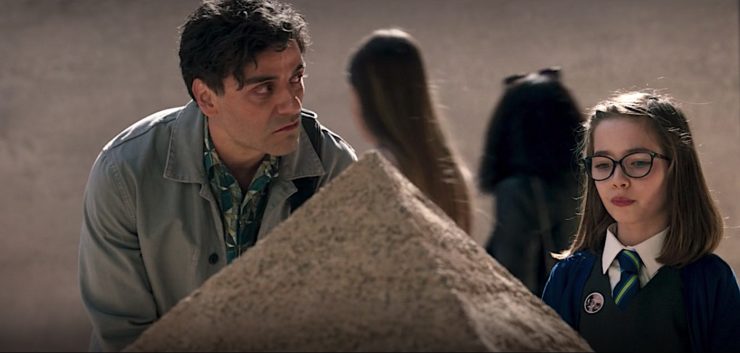
The action works well for an opening—by exploiting Steven’s blackouts, we get the sense that Marc is a serious badass, but we don’t see that right away. The show is able to impress us without cashing in all of its action shots immediately. It also underlines just how terrifying this situation is for Steven. He’s handling it way better than I would.
Back to that creepy scene with the kid: by having Steven explain some basic principles to a child, the show catches us up on any Egyptian stuff the audience might need without being condescending about it. By showing us Steven reading more serious texts about Egyptian religion and arguing with Donna, the show introduces the god’s names that we’ll need to know, as well as showing us that Steven knows his shit. A++ exposition, I say.
The show’s mysticism is matter-of-fact. When Arthur’s scales just move on his wrist, no one’s surprised by it, no one freaks out. The Voice that talks to Steven is annoyed, and he’s startled by it but not to the point of paralysis, so either he’s dealt with it before or he’s simply adept at rolling with uncanny situations. When Marc talks to Steven, their voices are different enough that his confusion seems genuine. Steven genuinely doesn’t hear Marc as another aspect of himself.
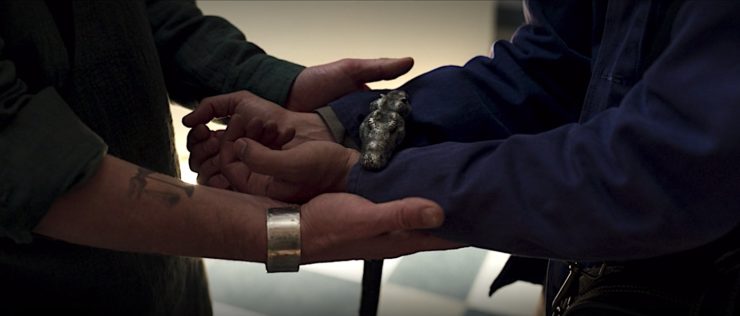
My knowledge of Ancient Egyptian religion isn’t expert level, but I do know a little bit! Ammit was a goddess who would hang back by the Scales of Judgement as Anubis and Thoth weighed the heart of the newly-deceased person. If the heart was found to be too heavy with sin, she would devour it, dooming the soul of dead person to wander the earth rather than finding bliss in the field of reeds. Given Steven’s creepy interaction with that unnamed kid, it seems likely that he was already kicked out of the afterlife once, which would be why Arthur is so entranced by him.
It’s also worth noting that, while this interpretation seems to be falling out of favor in Egyptology, scholars used to think that Egyptians saw life in terms of order and chaos. Life in civilization, i.e., the cities along the Nile river, was an example of order, and, thus, good. Life outside of that region, in the desert, the wilderness, or in other civilizations, was chaos, and, thus, very very bad. Under this theory, it was believed that Egyptian society was largely engineered to keep chaos at bay. Given that Moon Knight began life as a character in 1975, when that theory was still prevalent, it wouldn’t surprise me if part of the emphasis on Steven has having “chaos” in him is a nod to the idea that Egyptians regarded chaos as evil.
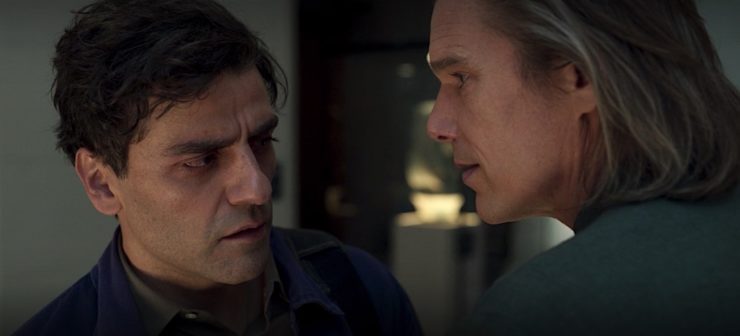
Oscar Isaac said that the show was going to deal with Dissociative Identity Disorder seriously, and I’m startled and happy to say that, at least in this episode, it does. The mystical shit and chase sequences are fun, of course, but underneath all of that there’s Steven, scared and confused, worried that he can never be fully part of a society that won’t understand his condition. How can he connect with anyone? And what’s awful is that, at least in this first hour, he seems to be right. Rather than being empathetic when he’s late because of a chronic health problem, his boss Donna insults him and assigns him inventory work as a punishment. The girl he likes tells him to lose her number when he misses their date because of a blackout. The security guard won’t learn his name. The only conversations he has are completely one-sided—he leaves a voicemail for his mum, he talks to his goldfish, and he talks to a living statue who may or may not even be a real friend. (After all, it’s not like the man can walk away from him.) He’s actually telling the living statue about his fear that, if a girl does want to come home with him, he’ll have to explain the whole bed shackle thing. (Although let’s be real, I don’t think many of us have dealbreakers where Oscar Isaac is concerned.)
In each case Steven’s innate decency comes through: he doesn’t tell Donna to fuck off, he reminds people to tip the living statue, he shares his candy with his goldfish. The scene where he orders himself a solo steak after he realizes he showed up for his date on the wrong night is genuinely upsetting. For all the ridiculous Marvel stuff, this is a real person trying to cope with an illness and receiving very little support. When we see him talking to his mother later, in what seems to be an actual conversation, he’s lying to her about his date because he’s ashamed to tell her what really happened.
Finally, Ethan Hawke is just, just, I mean, I’d follow Arthur. Hell, I’d help him build the compound.
Schrader Scale (of Judgement)
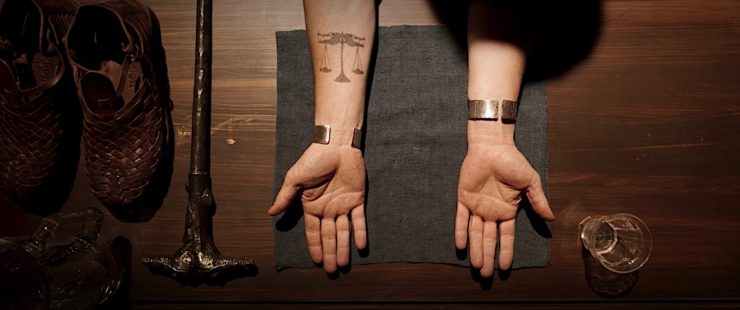
I’m not sure if this is going to apply to every episode, but it sure as heckfire applies to this one. Here’s the thing: I love the films of Paul Schrader. (Surprise.) When I learned that Oscar Isaac, who should have won all the non-Isaac Oscars for his performance in The Card Counter, was going to face off with the priest/caretaker of First Reformed, none other than Ethan Hawke-doing-a-David-Koresh-impression (seriously), it occurred to me that it might be fun to rate each episode of Moon Knight by how much it plays out like a Schrader film. And at least in the pilot, my idea was rewarded hundredfold.
First obviously there’s that opening. I could absolutely see Reverend Toller (or, hell, William Tell) doing the glass/shoe thing. Later we get Arthur reminding his followers that while a beautiful day in the alps may seem like Heaven, in fact we are all worms crawling upon this fallen Earth, waiting for the judgement of Ammit. Okay, he doesn’t call anyone a worm, but Khonshu calls Steven a worm, so it’s close enough. Steven stumbles through life as a slightly more comedic version of the typical Schrader protagonist, “God’s lonely man”—working a low-level job, keeping his head down while superiors bark orders and insult him, botching every attempt at dating. But of course there’s a much more violent personality roiling away in there. He doesn’t journal in this episode, but I fear it’s only a matter of time.
I’m giving “The Goldfish Problem” a solid 7.
I can not read the hieroglyphs!
Arthur: “We are here to make the earth as much like heaven as possible. Who’d like to go first?”
***
Arthur: “Will you accept your scales regardless of the outcome?”
***
Steven: “I’ll have the best bit of the steak. That’s the bit that I want.”
***
Arthur: “[…] even her own avatars”
Steven: “The blue people? I love that film.”
Arthur: “…Avatars.”
Steven: “You mean that anime?”
Arthur: “Steven. Stop.”
Leah Schnelbach really hopes that the next episode leans into Mishima! Come join them in the chaos of Twitter!










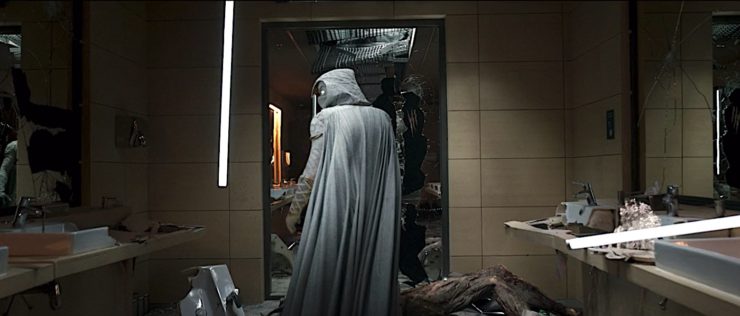
*golf clap*
For obvious reasons I have been waiting for this a long time. Ever since I self-googled and found the 1985 comic. Bwa ha ha.
Pretty sure Steven wasn’t talking to his mother during the second conversation either. He didn’t seem to be answering questions, just rambling. My guess is his mother’s dead and he can’t reconcile with it and keeps calling her number and leaving “voicemails” despite the mailbox being long past full.
Guess we’ll see!
Yes I really enjoyed this, the screen flickers as Steven loses possession and then comes back are really well done, okay the CGI on the car chase section was a little dodgy but apart form this the production values were well up there with what we have come to expect from the MCU. I have to say I know little to nothing of the Moon Knight character from the comics so am coming in pretty much blind to this and I think it’s the best way as I can enjoy the reveals without waiting for the bits I liked best to be brought to screen
Oscar Isaac is clearly having the time of his life as Steven, I have seen a few criticisms of his British Accent but to give him the benefit of the doubt this can be put down the character actually not being British, and in any case as a Brit I can say I have heard far worse… and also I can’t get away from the fact that I have heard British Actors in the MCU doing far weirder and worse accents in the last year or so, yes I am looking at you Ray Winstone.
It was okay. It had some amusing bits and some clever bits, but it’s not a character I’m familiar with or a genre I’m that interested in. I wasn’t even sure I wanted to watch it, but I’m interested in what the director said in interviews about presenting a more authentic, less stereotyped view of Egypt than we usually get, so I’m mainly sticking around for that part.
The opening scene with the broken glass was seriously wince-inducing. Although I guess it could’ve been worse. At least it wasn’t LEGO bricks. :D
The main thing that bugged me was the conceit that Steven didn’t know it was Sunday rather than Friday. How does he not have a clock and calendar on his phone? That’s the very first thing I see on my phone screen when it lights up, and I’m pretty sure that’s the default setting. But he was literally looking at his phone and he had to ask the waiter what day it was.
Also, the giant plastic muffin that fell off the truck onto the road in one shot was missing from the road in the next. Seriously, Marvel? Even that was digital?
@3/Kalvin: My interpretation at this point is that Steven’s mother doesn’t even exist. I don’t think he’s the real personality. That Layla person on the phone said that Marc had disappeared months ago. That might be when the Steven personality emerged.
The scene where he orders himself a solo steak after he realizes he showed up for his date on the wrong night is genuinely upsetting.
A reminder that Steven is vegan. So it’s even more upsetting knowing that he’s made a choice to break from his veganism when he’s at a breaking point.
It’s also why he doesn’t know what cut of steak to order and how it should not be cooked well done.
@6/Joruus: Come to think of it, while that was a neat bit of scripting with Steven not even knowing how to order a steak, I do find it hard to credit that a vegan wouldn’t know how to order a steak or what “How would you like it cooked?” meant. Just because you don’t eat meat doesn’t mean you wouldn’t be surrounded by people who do and be exposed to the terminology all your life. But then, maybe that’s a clue that Steven is a recently emerged personality, without the life experience to know these things.
And what’s wrong with well-done? That was always my preference back when I still ate beef. I never understood the appeal of leaving it undercooked.
@6/CLB Some cuts of beef can handle a good char. But a well-done center cut filet mignon might as well be a hockey puck.
Oh, I loved it. Maybe not quite as much as WandaVision (which will probably always be my favorite) but so far shaping up to be my number two Marvel show. I’m a sucker for something with a lot of ‘aesthetic’, shall we say, and this definitely had a great mindfucky, creepy, unsettling horror vibe. Both with the supernatural aspects, but also with the very disconcerting (and heartbreaking) and disorienting nature of Steven’s condition.
As the review mentioned, I loved the cinematography/imagery being used. And the soundtrack might be one of the best soundtracks so far (although I really love both the WandaVision/Loki soundtracks), at least in terms of making a strong impression. The composer (Hesham Nazih) is Egyptian, which is neat!
I definitely got a ‘hair shirt’ type of vibe from the glass-in-shoes. It may be a trope (the zealous ascetic trying to ‘purify’ the world) but so far Hawke is doing it well.
I am definitely on team ‘Steven’s mother doesn’t exist’ and is basically just a construct in their own mind. I suppose it depends on how they treat the alters and where they come from.
@8 The server’s the real villain in this episode. You work at a steak house and steer a patron toward a well-done filet when they’re clearly too distraught to know what they’re doing? Monstrous!
I know it’s a superhero story so they’ll eventually get to having the badass action happen onscreen, but I would be 100% okay with them not going that direction. The car chase worked so incredibly well for me that I’m much more interested in seeing how far they can take the time skip mechanic. Hopefully they’ll do some more escalation on that front before going full Marvel set piece.
Also here to flog that server. ‘Well-Done’, good god, man…
I liked the episode, and I’m eager to see where it goes from here.
@7 – Well done cooks all the flavor and juice out of a steak. Might as well order ground beef. Most steak aficionados say to never go past medium.
I was thinking Marc/Steven woke up in Switzerland. On further reflection, maybe Austria. But I’m still leaning Switzerland. There are slight differences in Swiss Duetsch, Austrian Deutsch and Hoch Deutsch, but not so much as my 20 plus old recollection of my time in the Army in Germany allows me to recognize in shop signs. I do recall that the bakery/pastry place sign looked…off…from my Frankfurt area memory.
I still reckon Switzerland somewhere north of Zurich.
The only thing I didn’t love was the costume, but I’m guessing we’re stuck with it.
CLB, if that’s the only reason you’re watching, I think you’ll be disappointed.
I’m confused about why everyone is reading the scene in the mountains as Germany? The town/surroundings is very obviously (to me at least) coded as Germanic Switzerland? Did I completely miss something?
@14/David Pirtle: I didn’t say it’s my only reason, just the primary source of my curiosity. And I don’t see why you think I’d be disappointed. The show has an Egyptian director, so when he says he’s going to portray Egypt the way Egyptians see it instead of the ignorant, stereotyped way Americans see it, I have no reason to doubt that. In the past few years, Marvel’s done well at representing non-Western voices, first with Black Panther and then with Shang-Chi.
@15 I see you.
I’m also in the mom doesn’t exist camp. I think that the postcards are from Marc.
I think that the sand around the bed was for the same reason he had the restraint tied around his ankle. If he’d gotten up during the night, the sand would’ve been disturbed, assuming that he was sleepwalking.
@18/Mike S: Yes, in-story the sand is clearly meant as a sleepwalking indicator, but I think Leah meant that it also served metatextually as a parallel with Harrow walking on glass. I think that might be a reach, though.
I’m not big on psychological horror, so this one isn’t exactly my cup of tea, but it was very well constructed, and Oscar Isaac did a great job. I’m looking forward to see how it unfolds.
I was a bit underwhelmed with the first episode of MoonKnight. I expected more tension. The overbearing sense of benign desperation and hopelessness brought about by mental illness was missing.
Khonshu’s commentary came across to me as a cheap imitation of Venom’s sarcastic comments to Eddie Brock.
Khonshu would be better portrayed as a silent foreboding presence visible just out of the corner of Steven’s eye. Imagine a Khonshu in the mold of the ghost of Christmas Future silently shadowing Steven and Marc, always on the periphery, just out of focus, always judging.
There must be a price paid for Khonshu’s patronage. One that terrifies Steven even though he can’t remember the bargain . Steven instinctively recognizes the grace of Khonshu as a curse. Marc believes serving as the avatar of Khonshu is s blessing.
The action sequence that introduced MoonKnight in full kit was badly staged. The creature MoonKnight beat to death was barely visible.
Who is Marc when clothed in Khonshu’s vestments? Is he a mystical killing machine in the mold of a super powered Rorschach from the Watchman? Or a mystical terminator methodically hunting his prey?
how does Steven’s influence weaken MoonKnight? Or will some aspect of Steven meekness save the day?
MoonKnight is a character with great potential. My fear it’s being wasted
If were penning the scripts Marc would be integrated with Moonknight and at war with Steven. Steven would see Marc/Moonknight as invader possessing his body. Marc/MoonKnight would be the quintessential other – a violent foreign entity in the service of an unknowable god threatening to consume Steven from the inside.
Whatever Khonshu hopes to accomplish would be reduced to a subplot. The true battle would be between Steve and Marc/Moonknight. The war for control.
In the end the story would be an allegory representing the ultimately hopeless battle with mental illness. It would be about Steve’s journey to accepting Marc’s presence & his discovery of the freedom and exhilaration of that comes from letting go and allowing Marc/Moonknight lose upon the world.
Moonknight could have been a fantastic horror/adventure similar to An America Werewolf in London. I don’t know what it is yet, but I do know it could have been great
@21/TheDudeofWV: “The overbearing sense of benign desperation and hopelessness brought about by mental illness was missing.”
Steven seemed benignly desperate and lacking in hope to me. He’s certainly far from happy. But he’s accustomed to what he thinks is simply a sleepwalking problem and has developed coping mechanisms to manage it. That’s a valid way of portraying mental illness too. You learn to live with it. “Mental illness” is as broad a term as “physical illness.” You can’t meaningfully generalize. There’s a whole range of different conditions that fit the bill, and some are severe and debilitating while others can be managed in a way that allows a fairly normal life. Steven is somewhere in between.
“The action sequence that introduced MoonKnight in full kit was badly staged. The creature MoonKnight beat to death was barely visible.”
That was the whole point. We’re not supposed to be seeing these things clearly yet, since it’s only the first part of the story. Steven doesn’t know what’s going on yet, so we’re not supposed to know. We’re discovering bit by bit along with him. Think of how many horror movies save the full reveal of the monster until the final act.
My problem with Moon Knight’s reveal is that it seemed to be a fully CGI construct and had the jerky, uncanny-valley movement of one. I’d rather have seen a real person in a real costume.
“Who is Marc when clothed in Khonshu’s vestments?”
That’s no doubt a question that will be answered over the remaining episodes. We’re not there yet.
I’m a huge fan of the character going back to his 1980 series. This show didn’t have much in common with what I think of as “Moon Knight” beyond a few superficialities, but what we did get was, I thought, outstanding. And, to be honest, the original version is essentially an “even more disturbed Batman,” which we just got in the theaters. I love that this version is a complete mystery and I’m enjoying trying to figure it all out. It proves once again how good the MCU/Disney+ is at taking the core ideas of their properties and tweaking them just a bit (or a lot), resulting in something new and fresh and modern. 11/10!
I had the same thought as CLB @5 re time and date appearing on most phones’ lock screens. Of course you can No-Prize / headcanon it that whatever biochemical or supernatural impetus lets Marc take over from Steven and Khonshu talk to him gives Steven a kind of contextual blindness that keeps such stuff from becoming apparent, but I’m not sure what purpose that might serve the consciousness that would be responsible beyond maybe a coping mechanism that clearly isn’t flawless.
The waiter didn’t ask “How would you like it cooked?” but “How would you like that?” — which is why Steven agrees (“good, yeah”) rather than replies with a level of preparation. I think it’s more likely that he misunderstood the intent of the question due to being out of it after everything that’s happened than due to being a vegan, although Joruus @6 is right about the latter fact making the steak order so (literally, not judgmentally) pathetic.
I’m not very up on the Moon Knight comics and mostly familiar with the early stuff by Doug Moench & Bill Sienkiewicz, but I enjoyed this first chapter beyond the usual complaint of a fight scene that felt too CGI and look forward to seeing where it goes.
There’s a bit of discussion that the country he suddnely appears in is Latveria of Dr. Doom fame. That would be pretty nice tie-in